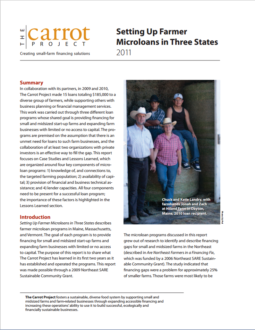According to a study conducted by The Carrot Project, 25 percent of farmers that request financing are denied access to credit needed for start-up and expansion costs. In 2009 and 2010, the Massachusetts-based nonprofit set up collaborative microloan programs in Massachusetts, Maine and Vermont. They facilitated 15 loans, with a median loan size of $12,300, totaling in $185,000 for small and mid-sized start-up and expanding farm businesses that had limited or no access to capital.
The Carrot Project used this experience to document the process in Setting Up Microloans in Three States.The publication includes case studies and lessons learned from the project so that others can help fill the gaps that prevent farmers from accessing capital. Their primary conclusions state that under the right conditions, lenders are interested in, and able to participate in collaborative programs; that private investors are willing to join in this effort and provide a flexible source of capital; and that the borrowers’ financial literacy is an important component for the success of any financing program.
Want more information? See the related SARE grant:
This material is based upon work that is supported by the National Institute of Food and Agriculture, U.S. Department of Agriculture through the Sustainable Agriculture Research and Education (SARE) program. Any opinions, findings, conclusions, or recommendations expressed in this publication are those of the author(s) and should not be construed to represent any official USDA or U.S. Government determination or policy.
